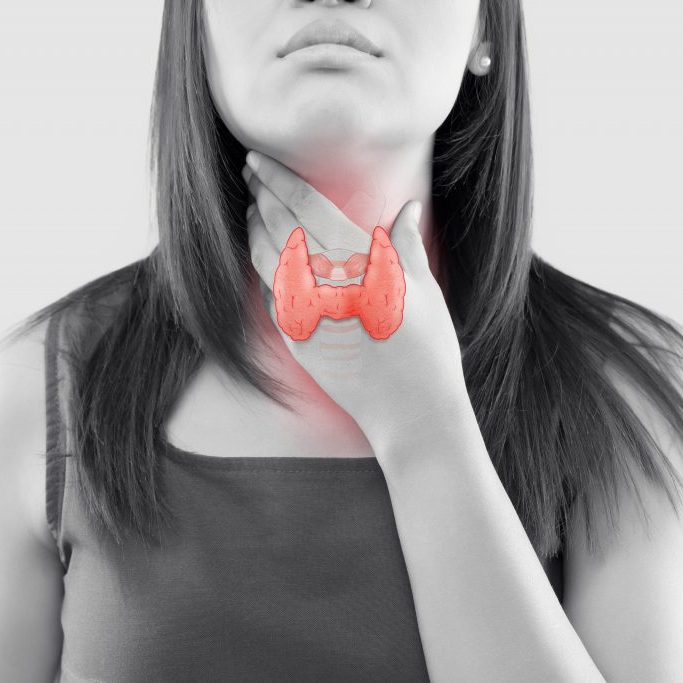With the increasing popularity of the topic ‘hormones’ the thyroid gland has also received more and more attention. Many people who have a hormonal problem have a compromised thyroid and vice versa.
A very large percentage of people with thyroid issues are not even aware of it, when actually symptoms are as prevalent as inability to lose weight, sudden weight gain, constipation, always feeling cold, hair loss…
But what is the thyroid actually and how does it influence our metabolism, body temperature, other hormones and therefore basically all processes in our body?
This blog is going to explore
→ What is the thyroid gland?
→ What are its functions?
→ Thyroid and metabolism
→ Common Thyroid diseases
And then the juicy stuff…
→ How to support Thyroid Health naturally (lifestyle, nutrition, stress management…)
So let’s get started!
[Rather listen to this in podcast form? Check out the player below or head to iTunes, Spotify, or Stitcher now!]
What is the Thyroid gland?? (1)
The thyroid gland is located at the front of the neck. It is one of the biggest glands in the body. The name comes from the Greek word for “shield”. It is not only the main “metabolism” gland in your body, it is an integral part of the endocrine system. If your thyroid doesn’t work properly, you probably have numerous hormonal issues and therefore also problems reaching your desired body composition. The thyroid is a very sensitive gland in regards to food, activity, stress etc. It produces the thyroid hormones triiodothyronine (T3) and thyroxine (T4) that regulate lots of processes in our bodies, like regulating hormonal balance, protein synthesis, and metabolic rate. There is a section in your brain called the hypothalamus that releases thyrotropin-releasing hormone (TRH). It tells the pituitary gland to produce thyroid stimulating hormones (TSH), which then tells the thyroid how much hormone (mostly T4) to produce.
The thyroid gland itself puts out a number of thyroid hormones, most of it being thyroxine, otherwise known as T4. More than ninety percent of thyroid hormone produced by the thyroid gland is T4, which is considered to be a pro-hormone because it has minimal metabolic effects on the body. Triiodothyronine (T3) on the other hand is the active thyroid hormone, but less than ten percent is produced by the thyroid gland. The rest has to be converted from T4.The majority of thyroid hormones produced by the thyroid are bound to a protein (thyroid binding globulin) to transport them around the rest of the body. At some point, T4 is converted to T3 in many tissues of the body, especially the kidney and liver, and free T3 then gets into the cells to carry out its metabolic effect. It should also be noted that a subset of thyroid hormones, T3 sulfate, and T3 acetic acid, must be converted to active T3 by gut bacteria (this is why gut health is so important for thyroid health, but more on that later). This Free T3 (fT3) can then act on thyroid hormone receptors – in other words, it is a metabolically active thyroid hormone. In contrast to this, Reverse T3 (rT3) competes with fT3 at the cell receptor site. It opposes the biological action of active T3 and slows metabolism, a vital function when the body needs to conserve energy. There has to be a balance of fT3 and rT3 to maintain optimum metabolic function. Think of reverse T3 as pumping the metabolic brakes.
Overall, it’s good to know that every cell in the body has receptors for thyroid hormone. The only other hormone that has receptors on every cell membrane is vitamin D. This makes sense given the need for our body to perceive light & external energy for circadian rhythm, but also external energy in the form of calories available from food (thyroid regulation).
What does the Thyroid gland actually do?
Most people know that the thyroid is the main control center for our metabolism. In a healthy thyroid, the production of T3 and T4 are strictly controlled. If this gets disrupted, things start going downhill. The thyroid works a lot like a thermostat, if it detects lots of high circulating T4 it will adjust the amount of TSH it secretes and that can lead to a “negative feedback loop”. In our example with the thermostat that means when the temperature in the room reaches the set temperature the heater switches off. When the temperature falls below the setpoint, the heater turns back on. This ‘mechanism’ is not working with an over- or underactive thyroid. Reasons for an over or underactive thyroid could be diet, medication, diseases, lifestyle, hormones… Very generally speaking, people with lab or blood measures of thyroid stimulating hormone levels in the upper quintiles have higher BMI and lower quintiles a lower BMI. Low thyroid hormone can also impact neurotransmitters.
For example, low thyroid hormone can cause low dopamine levels, leading to a loss of motivation and willpower and even depression, compounding the issues associated with weight gain and attempted weight loss. Low thyroid hormone leads to elevated cholesterol, triglycerides and gallstones. Low thyroid hormone also leads to poor digestive function, including low digestive enzymes and constipation. Low thyroid can also be interrelated to low testosterone in men and women as well. Thyroid hormone deficiency affects all tissues of the body, but has a very significant impact on testosterone.
How your Thyroid affects and regulates your Metabolism
Thyroid hormone (TH) regulates metabolic processes essential for normal growth and development, but it also regulates our metabolism. Research shows that thyroid hormone status correlates with body weight and energy expenditure. Hyperthyroidism, excess thyroid hormone, promotes a hypermetabolic state, that means an increased resting energy expenditure, weight loss, reduced cholesterol levels, increased fat burning (lipolysis), and gluconeogenesis (so using protein or muscle for energy).
This might sound great to some of you, but particularly the last point is not really desirable (more on that later). It also means having a hard time building muscle, absorbing nutrients properly, excessive sweating… And conversely, hypothyroidism, reduced thyroid hormone levels, means reduced resting energy expenditure, weight gain, increased cholesterol levels, reduced lipolysis (fat burning), and reduced gluconeogenesis. Overall, TH influences very important metabolic pathways that control our energy balance by regulating energy storage and expenditure. TH regulates our metabolism through actions in the brain, white fat, brown fat, skeletal muscle, liver, and pancreas.
So overall, TH plays a huge role in energy expenditure through both central and peripheral actions. TH maintains basal metabolic rate, facilitates adaptive thermogenesis (so our metabolism adjusts to certain circumstances), modulates appetite and food intake, and regulates body weight.
Basal metabolic rate (BMR), so how much we burn just by existing, is where we burn must of our calories. That means a reductions in BMR can result in obesity and weight gain. TH stimulates BMR by increasing ATP production (so the smallest form of energy food is broken down to, Adenosine Triphosphate) for metabolic processes. TH stimulates metabolic cycles involving fat, glucose, and protein catabolism and anabolism, so which ones are broken down and which ones are used to build things up (which becomes mainly important for determining whether we build or break down muscle mass and build or breakdown fat mass).
It is well established that thyroid status, either hypothyroidism or hyperthyroidism, is associated with changes in weight and resting energy expenditure (REE), so definitely worth testing regularly, particularly if you are having issues putting on muscle mass or losing weight even under controlled and consistent circumstances.
See what Cheryl Harris (MPH, RD) has to say in her article on “Thyroid Disease and Diet — Nutrition Plays a Part in Maintaining Thyroid Health (2)
“ > I have a tough time losing weight, I am trying to do everything that I can, and still I am struggling. Could it be because of my thyroid? <
I hear this complaint time and again from clients who have thyroid disease—and with good reason. To the great frustration of many of the 27 million Americans with thyroid gland issues, the thyroid has a profound impact on metabolism. Unintended weight gain and weight loss are common, and both can be a daunting challenge to rectify. Although weight may be the most common complaint, clients are also at an increased risk of cardiovascular disease and diabetes, underscoring the need to eat a balanced diet and adopt a healthful lifestyle. But since one-half of all people with thyroid disease are undiagnosed and weight changes are a common symptom, we as health professionals are in a prime position to spot potential thyroid conditions, make appropriate referrals, and help clients get a timely diagnosis and the treatment they need.”
The most common Thyroid issues (3)
Let me start off by saying that we are coaches who do invest time in research further education and we have certainly helped many people in the past, including ones with thyroid issues, but we are no medical professionals. If you think you have any of the following thyroid issues, we may be able to help you read your lab results, but please contact your GP for an actual consultation and diagnosis.
- As mentioned, Hyperthyroidism, or overactive thyroid gland, is a common thyroid condition. The most prevalent form is ‘Graves’ disease in which the body’s autoimmune response causes the thyroid gland to produce too much T3 and T4. Symptoms of hyperthyroidism can include weight loss, high blood pressure, diarrhea, anxiety, insomnia, loose stools, excessive sweating and a rapid heartbeat. Graves’ disease affects much more women than men and typically presents before the age of 40.
- Hashimoto’s is more common than Graves’ disease, but both are referred to as autoimmune thyroid disease (ATD), which has a strong genetic link and is associated with other autoimmune disorders, like type 1 diabetes, rheumatoid arthritis, lupus, and celiac disease. Symptoms include sluggishness, fatigue, muscle weakness, depression… Your immune system basically creates antibodies that damage your thyroid gland. It is unknown what causes your immune system to attack your thyroid gland. Some think a virus or bacterium might trigger the response, while others believe a genetic flaw may be involved.
- Goiter, or enlargement of the thyroid gland, can be caused by hypothyroidism, hyperthyroidism, excessive or inadequate intake of iodine in the diet, or thyroid cancer.
And the most common one…
- Hypothyroidism – an under active thyroid
Hypothyroidism means the thyroid secrets too little thyroid hormone and is almost always associated with low testosterone and other hormonal changes.
A research article on adult hypothyroidism (4) states that in hypothyroidism “characteristically, there is a slowing of physical and mental activity, and of many organ functions. When it comes to energy metabolism the thyroid hormone deficiency slows metabolism, resulting in a decrease of resting energy expenditure, oxygen consumption, and utilization of substrates. Reduced thermogenesis is related to the characteristic cold intolerance of hypothyroid patients.
The effect of thyroid hormone deficiency on appetite and energy intake is not precisely known but energy expenditure certainly decreases, leading to a slight net gain in energy stores. Body weight increases on average by 10% due to an increase of body fat and retention of water and salt. An increase of adipose tissue mass results in an increase of serum leptin, which mediates a decrease in energy intake while energy disposal increases. Interactions between leptin and thyroid hormone have thus attracted much interest. Biosynthesis of fatty acids and lipolysis are reduced.”
This essentially means if you are hypothyroid you are going to feel hungry more easily, less satiated and your body does not use fat for energy production as easily, it is more likely to store it.
Symptoms include:
→ Fatigue
→ Brain Fog
→ Constipation
→ Lower sex drive
→ Gynecomastia (male breasts)
→ Dry Skin
→ Thinning hair or loss of outer portion of eyebrows
→ Unexplained weight gain
→ Joint pain or stiffness
→ Mood swings
→ Depression
→ Sensitivity to cold
→ Heavy or irregular menses
→ Memory trouble
Possible causes:
→ Most of the time hypothyroidism is actually caused by Hashimoto’s (mentioned earlier) so your body begins attacking itself, which results in the destruction of tissue. So Hashimoto’s causes your body to start destroying the thyroid gland, which leads to its inability to produce adequate hormones.
→ Nutrient deficiencies, like those caused by excess stress, poor dietary choices, medication or hormonal birth control. Here is an example for how a nutrient deficiency could have a negative effect on the thyroid gland: Zinc and selenium are two minerals vital to the thyroid. They help the thyroid to produce T4 and to convert it to T3. Zinc also helps thyroid hormone communicate with cell receptors. Without these key nutrients, your thyroid’s ability to function can be severely compromised. B vitamins are required for the body to synthesize thyroid hormone. If you’re deficient in these, you will not produce enough thyroid hormone.
Hypothyroidism FAQs
→ How is Hypothyroidism diagnosed?
It can be diagnosed with a full thyroid panel. While running TSH only is common in many doctor’s offices, it’s important to know that it’s not enough. Yes, an abnormal level of TSH is a good indication that something is wrong with the thyroid, but it’s just one piece of the puzzle. A full thyroid panel is vital for finding and diagnosing the possible autoimmune disease early.
A complete thyroid panel should include the following blood tests:
→ TSH
→ Total T4
→ Free T4
→ Total T3
→ Free T3
→ Reverse T3
→ Anti-TPO Antibodies
→ Anti-Thyroglobulin Antibodies
→ Can I heal my thyroid naturally or do I need medication?
Whether medication is necessary is ultimately up to you and your doctor, but theThere are many natural ways to support thyroid health and reverse some of the underlying causes of hypothyroidism discussed previously.
→ What if my thyroid gland was surgically removed?
If you have your thyroid surgically removed, your body will be unable to produce any thyroid hormone by itself, thus making you hypothyroid. You will need to take medication.
→ Does Hypothyroidism cause irregular periods?
Hypothyroidism and hyperthyroidism can both contribute to irregular periods, missing periods, infertility, anovulatory cycles (no ovulation).
Essentially, every cell in your body needs thyroid hormone.
How to support Thyroid Health (5)
Since the thyroid hormone plays such a central role in the regulation of our metabolism, it is not surprising that nutrition in turn has a big effect on thyroid health. There are many things that play a role, but the most striking and important effects are related to your daily calorie and iodine intake. Lower calorie intake often means downregulation of our “thermostat” (so how many calories we are burning) by a lower secretion of TH. Iodine is more in charge of how well TH is synthesised and how smoothly it is produced.
Many other hormonal and metabolic changes during that occur in a prolonged calorie deficit or excessive surplus are also contributing to alterations in the regulation and metabolism of thyroid hormones.
So what does that mean?
Avoid being in a calorie deficit for too long or too often
Eat a Nutrient-Dense Diet
Eating a nutrient-dense whole-foods diet is an important step in managing thyroid disease. A few key nutrients that support the thyroid are:
→ Selenium
→ Iodine
→ Vitamin D
→ Zinc
→ Magnesium
→ Essential fatty acids
→ Iron
→ Vitamin A
If you find out you are particularly low in one or more of these, it might be a good idea to supplement and research specific foods high in what you are deficient in.
In most cases supplementing with 300-400mg of magnesium is almost always beneficial. If you are not consuming red meat or organ meat regularly it might also be beneficial to supplement with iron and if you are not outside for a large part of the day you may also want to consider supplementing with Vitamin D.
As mentioned before, of the many minerals that may affect thyroid function, iodine is the most important. It is an essential substrate for thyroid hormone synthesis and also interacts with the function of the thyroid gland on several levels. Iodine deficiency used to be the leading cause of goiter in the world and still remains so in certain regions. When severe, it can cause hypothyroidism and cretinism. Nowadays in the United States and the rest of the developed world, excess iodine intake or supplementation are more common than problems related to iodine deficiency. Excess iodine can be responsible for the development of goiter, hypothyroidism, and thyrotoxicosis. That means iodine supplementation is most likely NOT needed and could do more harm than good.
Heal Your Gut
As I mentioned before, most cases of hypothyroidism are caused by the autoimmune condition Hashimoto’s. And if you have an autoimmune disease, you know that your immune system is not behaving normally. What you might not know is that between 70% and 80% of your immune system resides in your gut!
Unfortunately, many of us have guts that aren’t in optimal shape. Leaky gut (or increased intestinal permeability) occurs when harmful proteins are able to pass through the intestinal mucosa, causing inflammation. Birth control pills, low-fiber diets and chronic stress are just some contributors to leaky gut.
The gut is also responsible for about 20% of the conversion of T4 to T3, so we really need a well-functioning gut in order to help the thyroid.
→ In addition to eating a whole foods diet, using curcumin extract, ginger root, L-glutamine, zinc carnosine, marshmallow root, and aloe vera can help be beneficial.
→ Remove potential food triggers, unnecessary medications, life stressors, bacteria, yeast, and parasites.
→ Create a healthy terrain and bring in quality probiotics with fermented vegetables and probiotic supplements can help your gut thrive.
* ditching hormonal birth control (HBC) can also help a great deal, since HBC can
→ Cause nutrient deficiencies by depleting vitamins and minerals crucial to thyroid function (like zinc, selenium, and B vitamins)
→ Elevate Thyroid Binding Globulin, a protein that holds onto your thyroid hormone (and once thyroid hormone is bound, it cannot be used by cells)
→ Cause inflammation – which can cause T4 to be converted to Reverse T3 (RT3) instead of T3? RT3 is designed to store fat and make you want to sleep, so basically the opposite of T3.
Avoid excess body fat levels, yoyo- dieting and overeating
Overeating produces an increase in the serum T3 concentration as a result of an increased conversion of T4 to T3.
Moderation is also what we want when it comes to body weight/ body fat. Extremes – too high or too low appear to have a negative effect on serum T3 production.
Manage Physical and Emotional Stress as best as you can
It is a well established fact that stress of any kind induces an increase in adrenocortical activity (so relating to the cortex of your adrenal glands) and tends not only to suppress TSH release but also to inhibit T3 production. Many of the changes in thyroid function like metabolic adaptation or changes in body temperature may be due, in part, to stress.
How exactly does that happen?
When we are under stress, any kind of stress, the HPA Axis steps on the gas to initiate a stress response. Many messenger hormones of the HPA Axis increase in an effort to raise cortisol. Increased CRH and cortisol inhibit the release of TSH, reducing T4 production. Elevated cortisol interferes with the conversion of T4 to T3, lowering overall T3 levels. Elevated cortisol levels also drive up the production of RT3 (mentioned earlier) and reduce cell receptor sensitivity to thyroid hormone. The combination of decreased T4 & T3, along with an increase of RT3, puts the brakes on metabolic function.
This becomes a problem when we are talking about chronic stress – too much stress at work, too much high intensity exercise, too little or too much food or low quality food, not enough sleep, too much caffeine, too much alcohol, too much emotional stress, sitting in traffic, arguing at home…realistically analyse your current stress levels! What are your main stressors? Where can you dial things back? Where can you get help? How much do you really sleep on a regular basis? Do you need to adjust your training frequency or intensity? Do you need to incorporate more stress relieving techniques like meditation, yoga or walks?…
TAKE ACTION!
Go easy on some foods (6)
Soy: If you have hypothyroidism it might be a good idea to avoid soy and soy products.The main problem is that soy may hinder absorption of the hormones that such patients take.
Cassava: a common staple in certain parts of Africa. This plant is known to produce toxins that can slow an already underactive thyroid, especially in the presence of an iodine deficiency.
Cabbage and cruciferous veggies: Yes. Even though they are good for us, cabbage and other cruciferous vegetables eaten raw in large quantities, especially in the context of iodine deficiency or borderline iodine levels, can result in hypothyroidism (7). These vegetables generate a substance that competes with the uptake of iodine by the thyroid.
Top Foods for Thyroid Health
*organic, because that means free of pesticides which could alter our hormonal profile since they are endocrine mimicking chemicals
Organic Swiss Chard
Chlorophyll helps increase energy and supports healthy detox). The thyroid is easily affected by toxins, which is why foods that support detox are so important. Try these leafy greens sautéed lightly with avocado or coconut oil. Salt and pepper to taste. They also make an excellent addition to a smoothie.
Wild Sardines
Rich in selenium and iodine, these little fish give you two of the major minerals that ensure healthy thyroid function.
Organic Spinach
This leafy green is loaded with minerals, including iron and magnesium, which are necessary for thyroid function.
Chicken with the Skin On!
Yes, eat some chicken with the skin on and enjoy a healthy dose of thyroid loving fat soluble Vitamins! But make sure your chicken is being fed only the best diet and is organic (no antibiotics) You could use Butcher Box to source our meat. After all, an animal that isn’t cared for isn’t the type of meat that will support your health.
Virgin Coconut Oil
Coconut oil helps with proper blood sugar balance, which indirectly improves the health of the thyroid and the adrenals.
Sweet Potatoes
These spuds are loaded with Vitamin A, which helps you use your thyroid hormone within the cell. Enjoy sweet potatoes with a healthy fat like ghee or olive oil and a little salt and pepper.
Wild Caught Salmon
Essential fatty acids balance the immune system and decrease inflammation so your cells can use your thyroid hormone. Salmon also supplies you with important thyroid minerals selenium and iodine. Wild caught salmon is preferred because farm raised do not have the same benefits.
Bone Broth
You’ve probably heard that organ meat is an amazing superfood. It’s true. It is. But not many people can get down with a hunk of liver or kidney pie…at least, not right away. To get similar benefits without having to eat all the organs you can simply consume bone broth. Bone broth is excellent for gut healing, which many thyroid patients need. It also provides minerals and vitamins, like magnesium and Vitamin A, that your thyroid needs to function well. You can drink it as it is or use it in sauces for cooking or make soups out of it.
Grass Fed Buffalo
High quality animal protein is essential for delivering amino acids, bioavailable minerals, and essential fatty acids. While you can find some of the same minerals in meat in foods like brown rice and leafy greens, these foods are not readily available to the body. Because people with hypothyroidism already have compromised digestion and absorption (this is why iron deficiency is common with hypothyroidism), it is important to consume foods with the most bioavailable forms of nutrients.
Organic Strawberries
Rich in Vitamin C, pairing your strawberries with iron containing foods will enhance your absorption. Plus, Vitamin C is an important antioxidant that protects you from free radical damage. Your adrenals also depend on Vitamin C. And if you’ve got a thyroid condition, then you definitely need to support your adrenals!
I hope you have learnt something about the little but oh so powerful gland in our body we call thyroid.
In summary: more people than we think have a compromised thyroid. However, in many cases the symptoms and often even the condition can be managed or reversed by managing lifestyle, nutrition and training better. These factors should always be addressed whether medication is needed or not.
If you need a little help managing nutrition, training and even your lifestyle better click HERE to apply for our coaching.
Resources:
- https://mp-body.com/articles-1/everything-you-want-to-know-about-the-thyroid
- https://www.todaysdietitian.com/newarchives/070112p40.shtml
- https://drbrighten.com/category/thyroid-hormone-balance/
- https://www.ncbi.nlm.nih.gov/books/NBK285561/
- https://www.ncbi.nlm.nih.gov/books/NBK285560/
- https://www.ncbi.nlm.nih.gov/pubmed/16571087
- https://www.ncbi.nlm.nih.gov/pmc/articles/PMC3496161/
- https://ncicertifications.com/thyroid/
- https://www.amazon.de/Beyond-Pill-Program-Hormones-Dangerous/dp/0062847058/ref=sr_1_1?__mk_de_DE=ÅMÅŽÕÑ&dchild=1&keywords=beyond+the+pill+jolene+brighten&qid=1596722312&sr=8-1
Other links:
Online coaching: https://tailoredcoachingmethod.com/online-coaching/#online-coaching-form
Supplements: Legion.com (20% discount)
Vitamin D: https://topnotchnutrition.com/products/vitamin-d3-clean-sustainably-sourced
Magnesium: https://www.gardenoflife.com/content/product/dr-formulated-whole-food-magnesium/
Iron: https://www.gardenoflife.com/content/product/vitamin-code-raw-iron/
Butcher’s Box: http://www.butcherbox.com/


























































































































































































































































































































































































































































































